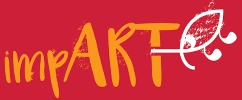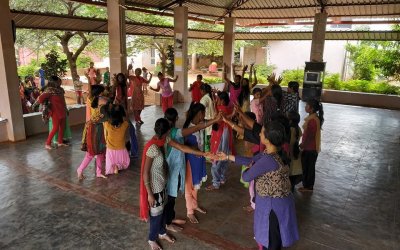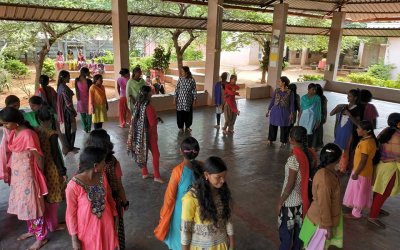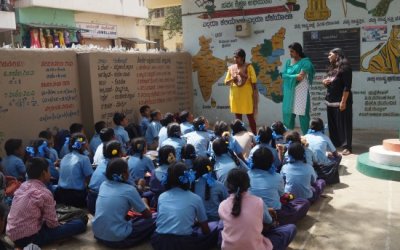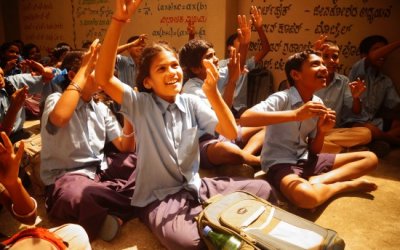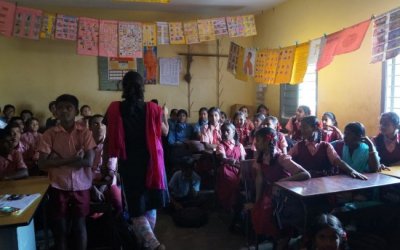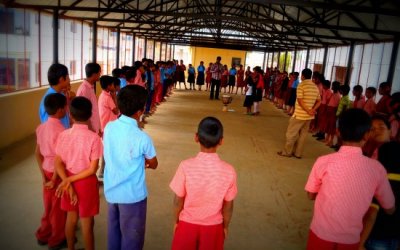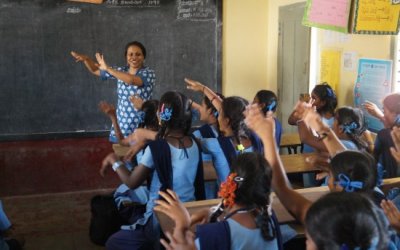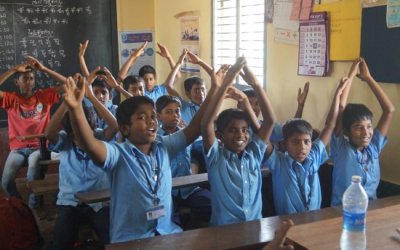Government Schools
Government schools are a great starting point to mainstream inclusion as there is evident acceptance of diversity in learning. Working with them has allowed us to further our efforts of taking creative interventions into schools and touch the lives of a vast spectrum of children.
At the heart of this programme is the belief that every student deserves access to arts practices that create opportunities for a learner to belong, learn together and meet learning outcomes with a sense of togetherness and acceptance. SF to harness the immense potential of arts in promoting social change and building stronger, more compassionate communities of children. In our true SF way, we are taking the universal language of the Arts to express our emotions, share our stories, and bridge divides.
Given the limited availability of resources and budget allocations, our direct interventions with government schools are largely self-funded and we invite people to contribute to this cause allowing us to reach many more beneficiaries and children.
Our Work with Government Schools in 2024-25
Number of Schools
Number of Children Impacted
Districts Covered in Karnataka
A commitment to equity, accessibility and respect for the unique abilities and perspectives of all individuals is an absolute prerequisite for promoting arts for inclusion. Our work of more than a decade has demonstrated that by creating an inclusive arts environment, we can foster creativity, empathy, and social cohesion within our communities. We believe that arts for inclusion means ensuring that all individuals, regardless of their background or abilities, have access to environments where one feels belonged and the freedom of choice.
Snehadhara Foundation began its work with children from government schools in local neighbouring communities in 2021. The programme began with 1 government school and the village community where the school was situated. In 2024, the programme has expanded to include a total of 7 government schools in 2024-25.
Sessions are conducted using arts practices working with children of different age groups and backgrounds, with varying learning needs and styles. Taking place at the respective schools and communities, the children, adolescents and adults come together and experience the art forms and learning in favour of their needs and preferences. Group sessions using arts practices touch upon multiple academic and learning content and topics while promoting psycho-social goals. These topics are used as an anchor to build on the goals of Cognitive, Language and Social Domains. Each of these topics are covered through different forms of arts including visual arts, music, movement, drama and play amongst others.
Different forms of arts, including but not limited to music, rhythm, dance, movement, drama, visual arts, storytelling, are primarily used to design sessions for the children. The sessions are inclusive in nature and built to create a non-threatening learning environment for the child.
The curriculum for 2024-25 is centred around Environmental and Home Sciences as drawn from the Central and State Boards of Education and National Institute of Open Schooling (NIOS), an institution under the Ministry of Education, Government of India. Home Science is a multidisciplinary field that encompasses various aspects of domestic life, including nutrition, food science, textiles, human development, family relations, and home management.
In the context of children from government schools, home science becomes particularly relevant and beneficial. The curriculum leverages home science concepts to tailor a learning curriculum for this particular group and context. By incorporating home science concepts into their daily routines, the primary focus is to empower children with the skills and knowledge necessary to foster independence, heighten awareness about their surroundings, and provide meaningful real-life experiences.
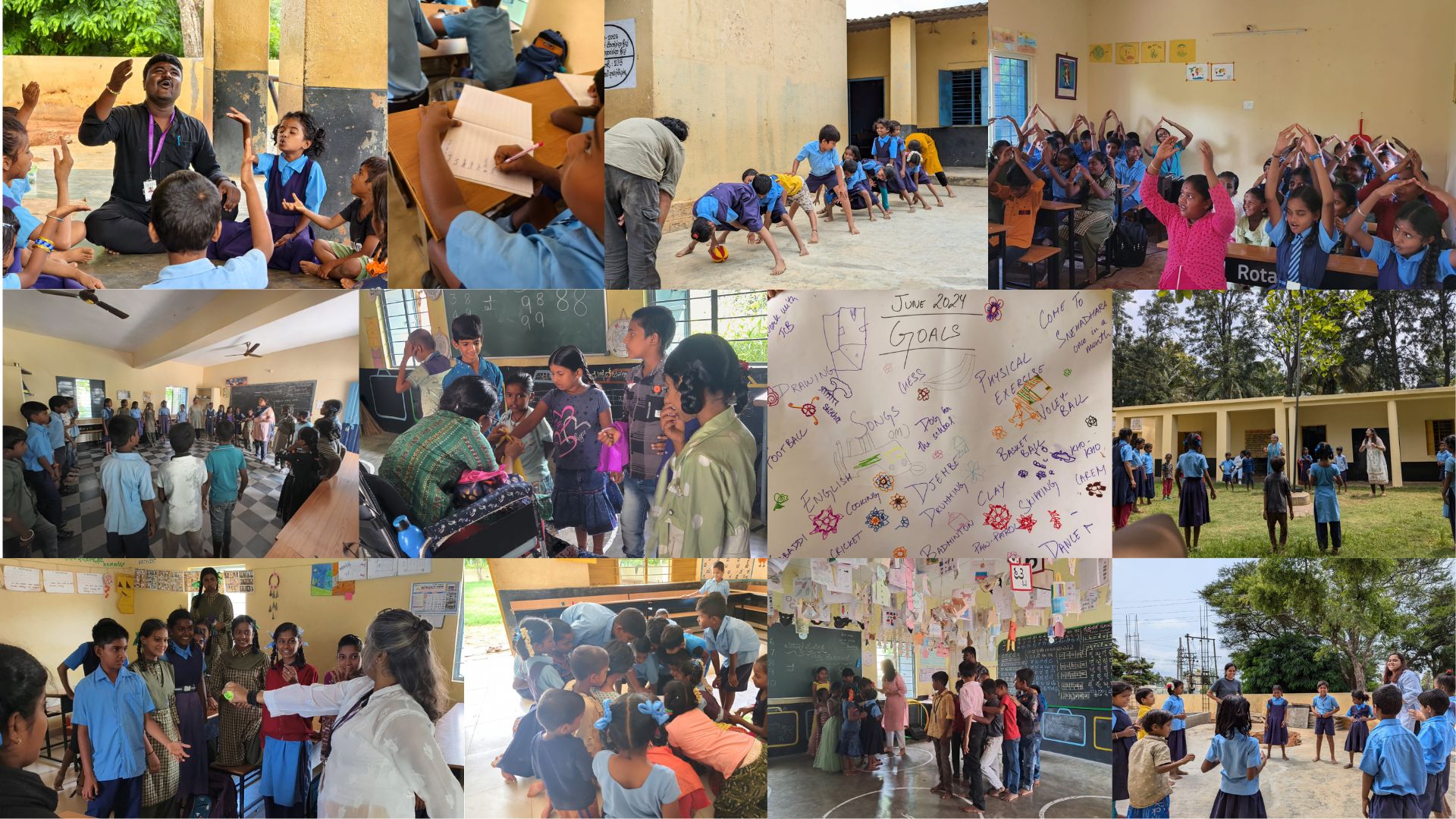
GLPS School Arjunabetahalli
Since 2021, Snehadhara has been working with the Government Lower Primary School at Arjunabetahalli to meet spoken English goals. There has also been a consistent focus on their psychosocial and emotional wellbeing. The work with the group has also largely been about creating inclusion by bringing the group to the Direct Care campus and in Sangam programmes to increase their social world. Arts-based methodologies have been used to meet these goals and the group has seen tremendous shifts in their inclusion quotient through these programmes.
Higher Primary School, Basavanahalli
Our work with the Basavanahalli School that flagged off in 2024 has been focussed on bringing together the children and introducing them to arts-based experiences, focussing on their learning goals and outcomes. Academic topics are taught using multi-arts, making learning fun and more accessible to all.
Lower Primary School, Guttepalya
The young children at the Guttepalya Lower Primary School have been a part of sessions with stories, music and dance- bringing together the arts methodologies to work with them on psychosocial well-being and creating inclusion. The group has also had an opportunity to visit our campus and interact with children with disabilities in an inclusive and open environment.
Lower Primary School, Byrashetahalli
The children of the lower primary school at Byrashetahalli have started working with arts based methodologies and experiencing music, dance, drama, play and visual arts to meet their learning goals and outcomes. The group and teachers have shown immense openness to the new methodology and welcomed the SF team with open arms to meet learning outcomes together.
Lower Primary School Hyadalu
The sessions at the Lower Primary School Hyadalu at Nelamangala Road look at opportunities for the group to build on social and emotional skills through songs, movement, play, drama and visual art. The sessions continue to explore art forms and give the group a space to express themselves and find the fun and joy in learning together. There have also been opportunities for children with disabilities from our campus to visit the groups there in our strive towards inclusion.
Golahalli Higher Primary School
The sessions at Golahalli Higher Primary School with the children have been full of stories and songs alike, with the group coming together beautifully to experience ways of expressing themselves using the multi-arts. They have been delving into multiple short stories, songs and more to work towards their psychosocial and emotional wellbeing and create experiences of inclusion. This year has been focussed on meeting academic and learning goals by making curriculum more accessible through the arts.
Gopalapura Higher Primary School
The sessions at Gopalapura Higher Primary School with the children have been an opportunity to understand academic concepts using multi-arts methodologies. The group has explored different professions, and focussed on the bodily systems and learning those through songs, dance and drama! The goal has been to make learning fun and easy for the diverse learners within the space.
Previous Work with Government Schools
- Hitha Chinthana School, Golahalli
- NSHPP Government School, Nelamangala
- Bandhavi, Koppal
- Hulimavu Government School
- Puttenhalli Government School
- Konankunte Government School
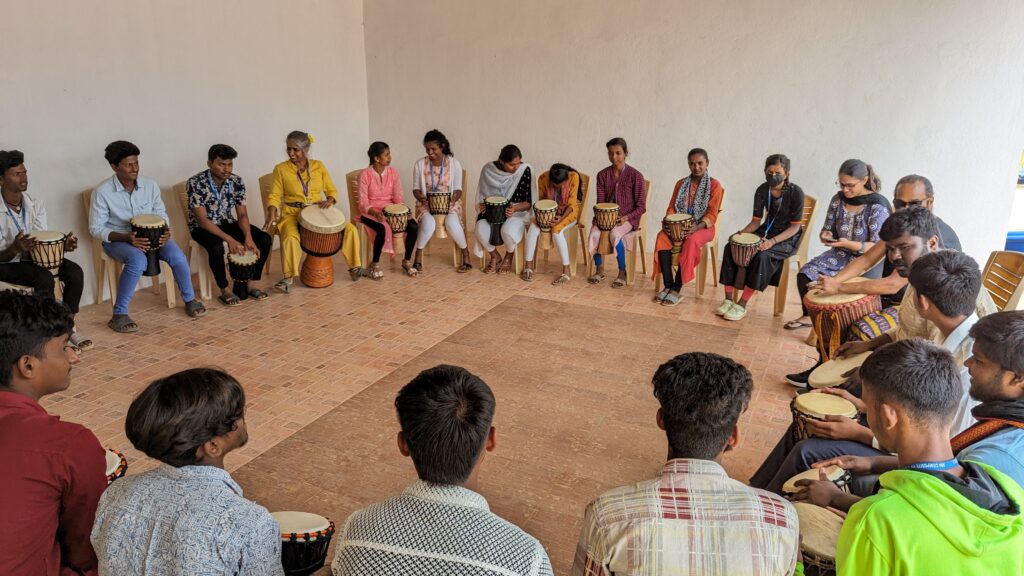
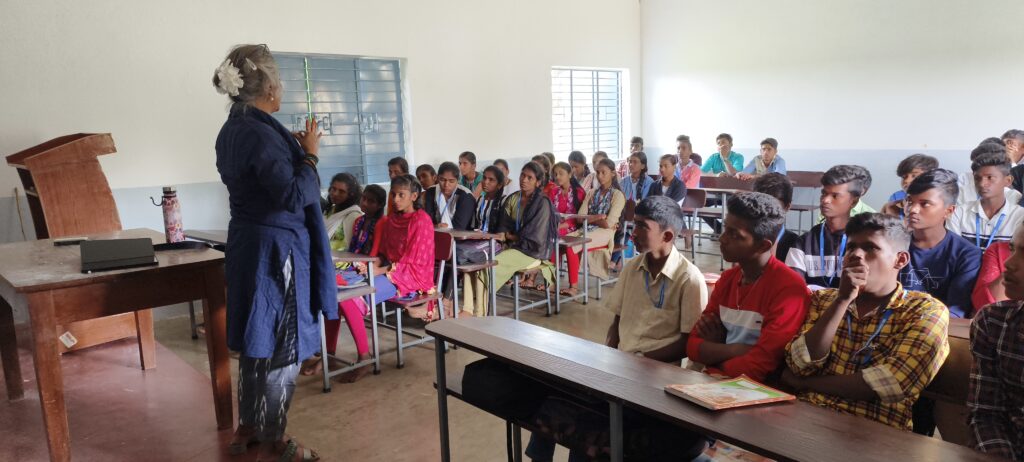
Our work with the PU group at the Hitha Chinthana School, Golahalli is focussed on creating opportunities of learning for the group and inspiring them towards their future. Using arts-based methodologies lends itself to give them a safe space to express. The group has been speaking about entrepreneurship and role models through the sessions, getting inspired to better themselves, and sharpening their goals and dreams.
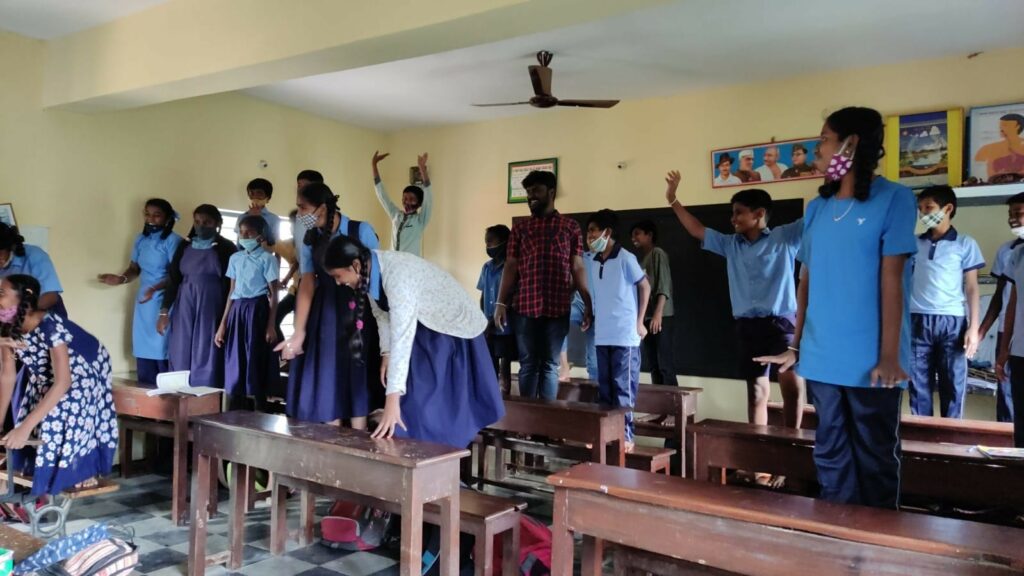
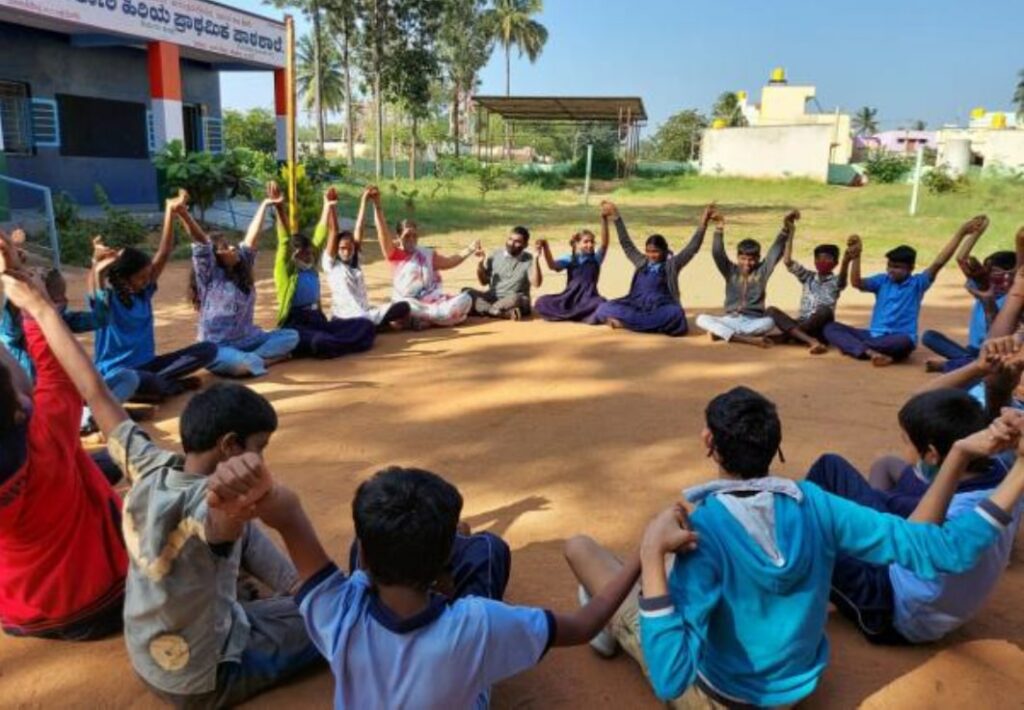
The NSHPP Government School was the first school that we started working with in Nelamangala. The programme saw us looking at psychosocial well being and academic syllabus through the multi-arts. Using theatre, drama, play, movement, visual arts and music, the group was able to work towards these goals. It was also an opportunity where we took children with disabilities from our campus to their premises to give them classroom learning experiences. The children of the school continue to have questions on how people are different, they continue to promise learning spellings and the children continue to tell us that we can ally with each other and do this together.
Through Visthar we reached out to the children and educators of Bandhavi, at Koppal where the daughters of Devadasis receive a holistic education. We flagged off impART’s programme for the children and educators of Bandhavi, with a monthly workshop series on Facilitation through the Arts from December 2018 to February 2019. The sessions saw 27 children and 7 facilitators gather and re-imagine their worlds, aspirations and acknowledged their own power to be the change in the Universe. They explored the use of the arts to express their inner landscapes.
We began a programme association with Riddhi Foundation, to focus on using multi-art forms and technology to enrich learning within classrooms for children at the Hulimavu Government School, Bangalore. The various artistic tools to be used include: Music – Voice and Rhythm, Dance and movement, Stories – sharing and creating, Visual arts, Theatre and drama, puppetry and role plays. The aim was to create a platform for peer and socio-cognitive learning.
In 2015-16 the focus was on Class 6. The objective of our work was: To draw Content from English and Science textbooks for Class VI and deliver them using multi-art forms. In 2016-17 the objective of our work was to draw content from English curriculum. We facilitated 20 contact sessions each in English with Grades 6th, 7th and 8th. Sessions were explored using artistic processes like storytelling, dance and movement, and music and theatre to address the language needs.
As a part of this year long program we worked with the Puttenhalli School redesigning a part of their science textbook content artistically. The aim was to address gaps in the language and social domain. The concepts of water cycle, conservation and eco systems were brought to the classroom through movement, voice, visual arts and play. This program was supported by India Foundation for the Arts (IFA).
